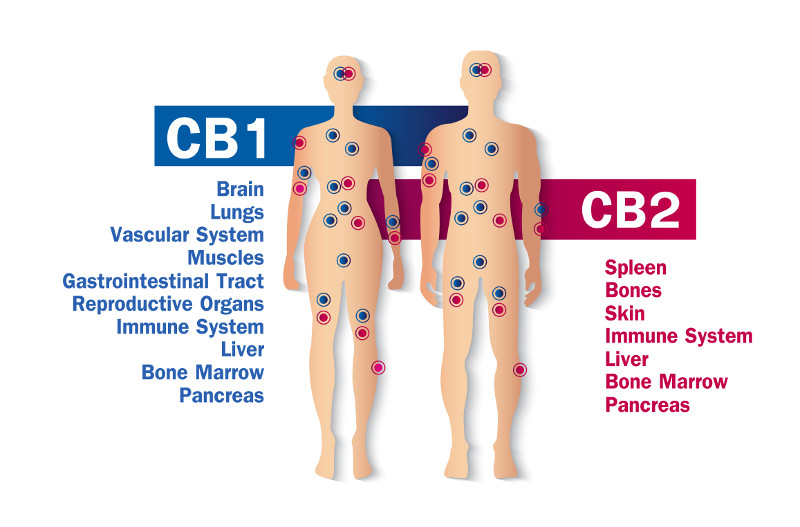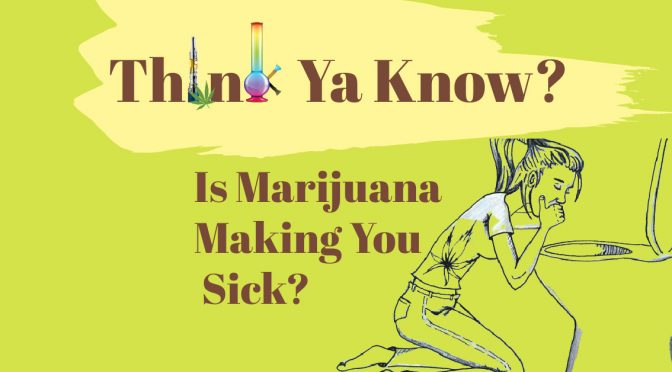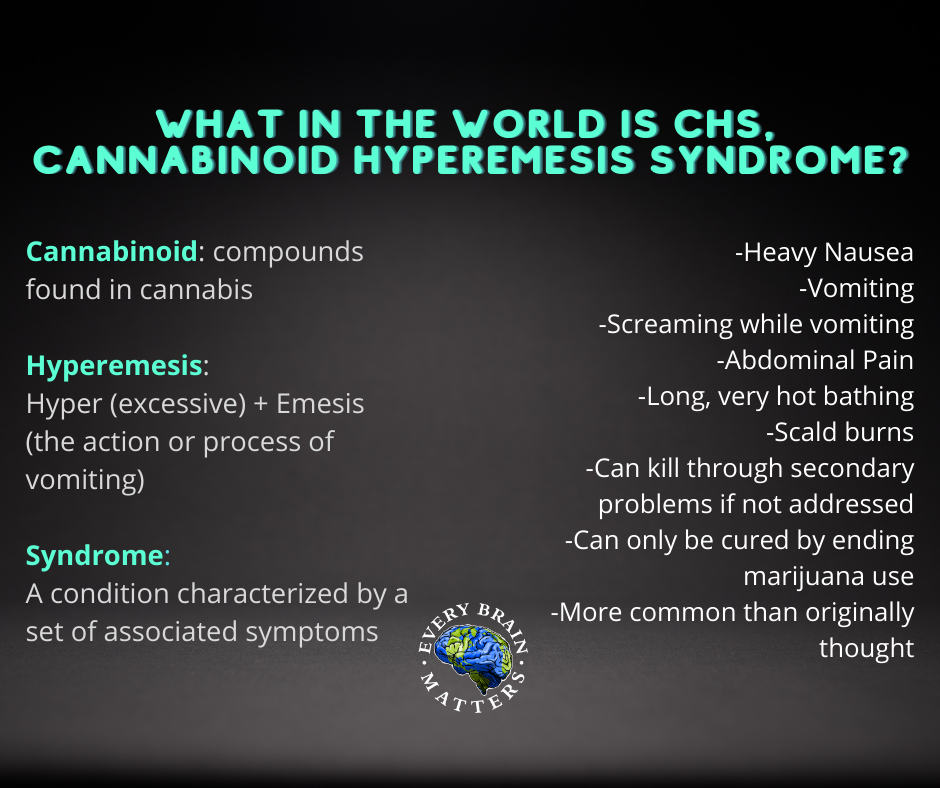Does “Weed” Cure or Cause Nausea?
While there are FDA approved THC medicines out there to help with certain cases of nausea, there is a much more insidious adverse reaction many marijuana users are experiencing, which can leave them begging for relief, or even kill them.
Emergency rooms around the U.S. are seeing an influx of patients with mysterious symptoms of severe abdominal pain and cyclic vomiting. The patient’s gastrointestinal heaves are often accompanied by screaming. “Scream Vomiting,” or “Scromiting,” is caused by THC and CBD products. If you, or someone you know, experience constant nausea, and severe abdominal pain and you are frequently using marijuana, stop cannabis use and immediately seek medical attention. This could be a serious, life-threatening illness.
Cannabis from legal and illegal markets, and in any form — vapes, edibles, flower or concentrates — can cause this painful disorder. Frequently the sufferers have scald marks on their skin from the extremely hot baths/showers, which they find is the only way to temporarily relieve the pain. It has been reported that many writhe in pain or bicycle in the air for relief. The medical name for this disorder is Cannabinoid Hyperemesis Syndrome (CHS).
For ideas on how you can help spread the word about CHS and ideas on how to help, see the “Action” section below.
CHS is difficult to diagnose due to lack of education. This, coupled with the fact that diagnosis is reached through exclusion rather than a specific test, which makes it extremely important that you are honest about your drug use. CHS can kill.
There is only one cure for CHS. STOP CANNABIS USE.
Since THC and other cannabinoids such as CBD are fat soluble, they naturally collect in fatty tissues and therefore are not immediately excreted or metabolized. Immediate cessation of products containing THC or other cannabinoids may not provide immediate relief because the body needs to first rid itself of the culprit cannabinoids or basically detoxify itself. The detoxification period may take days, weeks, or even possibly months depending on the history of use, so being under the care of an experienced medical professional is very important to ensure a positive outcome.
The Science
Before we get too deep into the science, it is helpful to know that the chemicals or cannabinoids (THC and CBD) in the marijuana plant affect the human endocannabinoid system (ECS). The ECS interacts with other systems and helps regulate to maintain normal function (homeostasis). The below diagram shows where cannabinoid receptors are located in our bodies. Externally consumed THC and CBD can overload these receptor sites. That changes the way the ECS functions, many times adversely. Experts say Cannabis Hyperemesis Syndrome is an adverse reaction similar to being poisoned.

In past decades, CHS was not common. But with the legalization of marijuana, especially of high-potency products, it is now the main reason people seek medical attention for marijuana-related harms in Colorado emergency rooms. It is urgent to get this information out to the public, before it’s too late. Two good sources with easy to navigate pages are EveryBrainMatters.org and IASIC1.org.
The U.S. National Institute of Health states:
Cannabinoid hyperemesis syndrome (CHS) is a condition in which a patient experiences extreme nausea, cyclical vomiting, and severe abdominal pain after using cannabis. This disorder is characterized by:
1) chronic regular cannabis use, predating the onset of illness;
2) a cyclical pattern of hyperemesis every few weeks to months, at which time the patient is still using cannabis and
3) resolution of the symptoms after cessation of cannabis use and detox/withdrawal period…
4) symptoms are relieved by hot baths or shower
See full educational article from the U.S. National Institute of Health: Cannabinoid Hyperemesis Syndrome.
The Western Journal of Emergency Medicine published a scientific paper, in March 2018, on the treatment for CHS:
“Antipsychotics including haloperidol and olanzapine have been reported to provide complete symptom relief in limited case studies. Conventional antiemetics including antihistamines, serotonin antagonists, dopamine antagonists and benzodiazepines may have limited effectiveness. Emergency physicians should avoid opioids if the diagnosis of CHS is certain and educate patients that cannabis cessation is the only intervention that will provide complete symptom relief.”
Scientists are beginning to study deaths caused by CHS:
This abstract in the Journal of Forensic Science mentions three such deaths.

Scientific Factoids
| In 2004, Australian researchers published the first article that concluded CHS is associated with chronic cannabis abuse. |
| More CHS patients used inhaled marijuana/THC (vapes, smoking, etc) than edibles, but both can result in CHS. Edibles did seem to be more responsible for acute psychiatric problems. |
| CHS is still new, and it often goes undiagnosed. Yet one surprising symptom can be the first clue: abnormal washing behavior (ie: taking long hot showers). |
| It is possible that up to ⅓ of heavy cannabis users will experience CHS, concluded researchers in a New York City Emergency Room. |

| “Brian continued to have minor symptoms; we were both in denial of the diagnosis. The GI doctor confirmed the diagnosis of CHS, and his only information was to quit smoking marijuana. But Brian resumed smoking, and for 6 months did not complain of symptoms. On Oct. 7, 2018, Brian had to be taken to the ER for vomiting. His kidneys had begun to fail, and his heart rate was too high.” |
| Read Brian’s Story Now |
Take Action
If you, a friend, or a family member are experiencing some of these symptoms, it is important to see your doctor as soon as possible. If the medical doctor is not familiar with CHS, take him/her this article or one of the scientific studies. Also, there are CHS recovery groups on social media that you or your friend can join and be part of a recovery community. Marijuana Anonymous may also be a helpful support group. Contact [email protected] if you need help finding a CHS recovery community.
Share this Think Ya Know? article with anyone you know in Emergency Care Centers. Share this blog post . Use hashtag #CHS.
Subscribe to EveryBrainMatters Youtube channel to view our soon to be released podcasts on Cannabinoid Hyperemesis Syndrome and other education about marijuana.
We want to make Cannabinoid Hyperemesis Syndrome a widely know diagnosis. This way it can be caught early and spare much pain and suffering and even save lives.
Share the below meme in social media!
Keep a lookout for our new activist campaign!
We call it 10-10-10.
We will start with a CHS Awareness campaign. We plan to send you a quick email with 10 Facts about CHS, 10 tell-tale signs of the illness and ask you to share the information with 10 friends.




